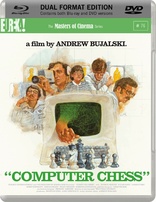Computer Chess Blu-ray Movie
HomeComputer Chess Blu-ray Movie 
Masters of Cinema / Blu-ray + DVDEureka Entertainment | 2013 | 92 min | Rated BBFC: 15 | Jan 20, 2014
Movie rating
6.3 | / 10 |
Blu-ray rating
| Users | 5.0 | |
| Reviewer | 3.5 | |
| Overall | 3.5 |
Overview
Computer Chess (2013)
Set over the course of a weekend tournament for chess software programmers thirty-some years ago, Computer Chess transports viewers to a nostalgic moment when the contest between technology and the human spirit seemed a little more up for grabs. We get to know the eccentric geniuses possessed of the vision to teach a metal box to defeat man, literally, at his own game, laying the groundwork for artificial intelligence as we know it and will come to know it in the future.
Starring: Kriss Schludermann, Tom Fletcher (XI), Wiley Wiggins, Tishuan Scott, Jonny MarsDirector: Andrew Bujalski
| Period | Uncertain |
| Comedy | Uncertain |
Specifications
Video
Video codec: MPEG-4 AVC
Video resolution: 1080i
Aspect ratio: 1.31:1
Original aspect ratio: 1.33:1
Audio
English: LPCM 2.0 (48kHz, 24-bit)
Subtitles
English SDH
Discs
50GB Blu-ray Disc
Three-disc set (1 BD, 2 DVDs)
DVD copy
Playback
Region free
Review
Rating summary
| Movie | 3.0 | |
| Video | 5.0 | |
| Audio | 5.0 | |
| Extras | 4.5 | |
| Overall | 3.5 |
Computer Chess Blu-ray Movie Review
Reviewed by Dr. Svet Atanasov February 3, 2014Screened at the Berlin International Film Festival, Andrew Bujalski's "Computer Chess" (2013) arrives on Blu-ray courtesy of British distributors Eureka Entertainment. The supplemental features on the disc include original trailers for the film; exclusive video interviews with director Andrew Bujalski, actor Wiley Wiggins, and producer Alex Lipschultz; audio commentary by Deep Blue programmer Murray Campbell; and more. The release also arrives with a 56-page illustrated booklet featuring a new essay by Craig Keller; a discussion on retro gaming with Wiley Wiggins; a profile on cover artist Cliff Spohn; a plethora of full-color photography from the set; and more. In English, with optional English SDH subtitles for the main feature. Region-Free.
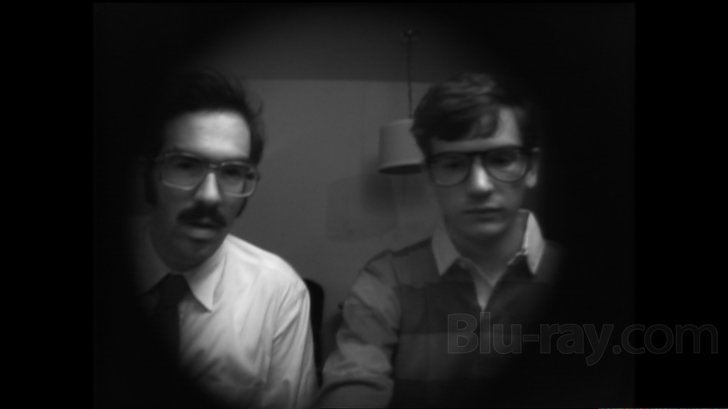
Programmers
The film is set in the early ‘80s and follows closely a group of nerds at a tech convention who have gathered to show their latest chess programs. Some belong to sponsored teams, others are there alone. They are all staying in a cheap hotel infested with unusually bold cats.
A series of short interviews in the beginning of the film quickly make it clear that the nerds will be competing with each other until the winner with the best program faces a rather cocky chess master who also happens to be the convention’s host (played by Boston film critic Gerald Peary). There is a cash prize ($7,500), but the money is rarely mentioned. For the first time ever there is a female (Robin Schwartz) at the convention and this is a fact that is frequently mentioned.
By the time the elimination games begin, it is already clear that the audience is watching a mockumentary.
There are a number of very funny sequences. In one of the better ones, a swinging couple who happen to be in the hotel for a different convention invite one of the nerds to their room and attempt to seduce him, but he courageously resists the temptation. In another sequence, a few of the nerds gather in a big room and begin discussing the pros and cons of artificial intelligence while smoking pot. A brilliant nerd then boldly announces that in the future computers will make dating a lot easier. There is also a pretty good sequence with a tall programmer named Michael Papageorge, who is denied a room in the hotel and is constantly wandering around trying to find a place to sleep.
Director Andrew Bujalski (Funny Ha Ha, Mutual Appreciation) shot Computer Chess with old black-and-white video cameras to give it an appropriate period look – there is only one very short dream sequence that is in color – and for the most part the film really does look like an odd documentary from the early ‘80s. To be perfectly clear, the footage is notably soft, detail and contrast fluctuate, and there is quite a bit of interlacing.
Excluding the appropriate period look, however, the rest of the film is rather underwhelming. Some of the more serious conversations between the nerds produce good, though rather ironic, observations about the unlimited opportunities in a wired world, but the eccentric behavior quickly becomes annoying. It is possible that some viewers may find precisely this eccentricity rather fascinating, but while watching the film, this reviewer felt as if he was forced to observe a group of unusual mental patients who don’t fully realize that they exist in a bubble that has little in common with the world where normal people live.
The performances are excellent. There are a number of non-professional actors whose body language is unquestionably the real deal. The hairstyles and clothing are also very convincing.
Director Bujalski must have spent a great deal of time tracking down the equipment seen throughout the film because at this point some of these pieces can easily be placed in a museum. The giant computers the nerds are seen moving from room to room, in particular, look quite astonishing.
* In 2013, Computer Chess won Alfred P. Sloan Feature Film Prize (for its offbeat and formalistically adventurous exploration of questions of artificial intelligence and human connections) at the Sundance Film Festival.
Computer Chess Blu-ray Movie, Video Quality 
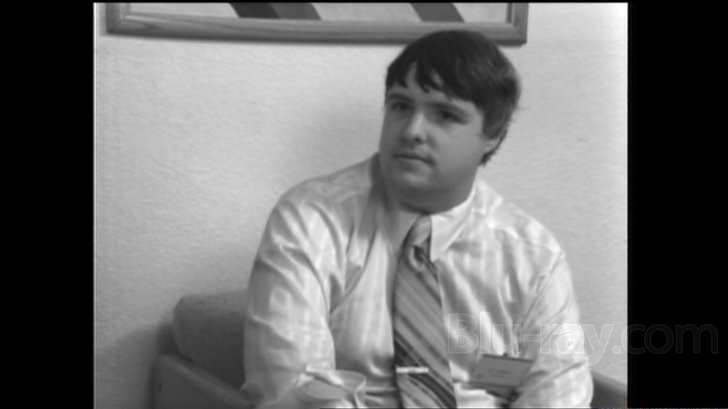
Presented in an aspect ratio of 1.31:1, encoded with MPEG-4 AVC and granted a 1080i transfer, Andrew Bujalski's Computer Chess arrives on Blu-ray courtesy of British distributors Eureka Entertainment.
Shot with old black-and-white analog video cameras to give it an appropriate period appearance, Computer Chess certainly looks different on Blu-ray - but it definitely looks right. Excluding the one and only color sequence, the film looks notably soft, contrast fluctuates, and there are even some inherited trailing-like effects (see screencapture #10). Blacks and whites are fairly well balanced, but again there are various inherited limitations that occasionally affect image stability. In other words, the film never looks as crisp, vibrant, and stable as a modern documentary shot with a new HD camera would. Lastly, there are absolutely no purely transfer-specific anomalies to report in this review. (Note: This is a Region-Free Blu-ray release. Therefore, you will be able to play it on your PS3 or SA regardless of your geographical location. For the record, there is no problematic PAL or 1080/50i content preceding the disc's main menu).
Computer Chess Blu-ray Movie, Audio Quality 
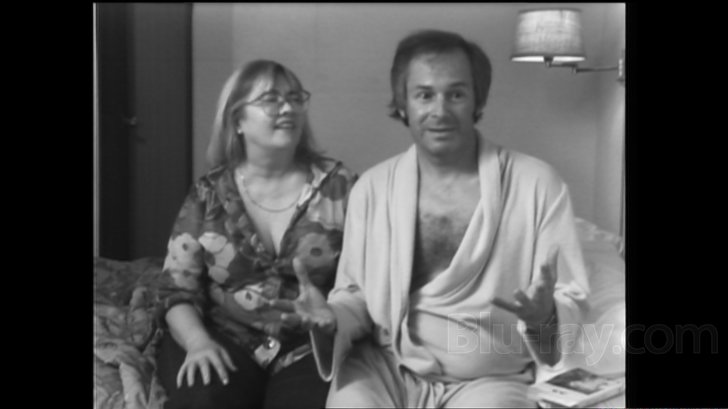
There is only one standard audio track on this Blu-ray release: English LPCM 2.0. For the record, Eureka Entertainment have provided optional English SDH subtitles for the main feature.
Depth and clarity are quite good, though the dynamic intensity is quite modest. However, considering the fact that the film aims for an appropriate period look and feel, this should not be surprising. The dialog is always stable and easy to follow.
Computer Chess Blu-ray Movie, Special Features and Extras 
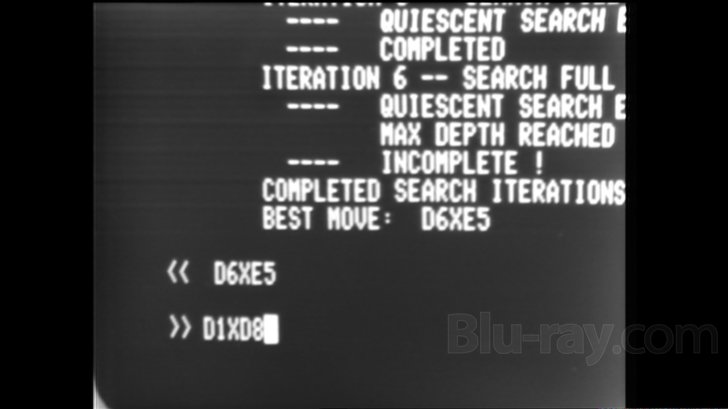
- Trailers - in English, not subtitled.
1. Trailer 1 (2 min).
2. Trailer 2 (3 min).
3. Outtake Trailer (2 min).
- Promotional Material - in English, not subtitled.
1. Kickstarter Video - a very entertaining spoof in which Andrew Bujalski tries to sell his future film to a Hollywood executive who seems unimpressed by his description. (4 min).
2. Hot Old Personal Computer #1-6 - a collection of six promotional pieces made by Andrew Bujalski. The style of the promo pieces imitates that of Computer Chess. (6 min).
3. Reference Chess Games #1-8 - an in-depth piece on the history of computer chess with an abundance of factual information. The documentary, which references different real games, such as David Levy's clash with Chess 4.7 at the Canadian National Exhibition in Toronto in 1978, was directed by Andrew Bujalski. (46 min).
4. How to Operate Sony AVC-3260 - a look at the Sony camera which cinematographer Matthias Grunsky and Andrew Bujalski used to shoot Computed Chess. (5 min).
5. Sundance Promo - a very original promo piece in which Andrew Bujalski is asked to describe his film. (3 min).
6. London Film Festival Introduction - Andrew Bujalski introduces Computer Chess is a more traditional manner. (2 min).
- Interviews - the three interviews below were conducted exclusively for Eureka Entertainment's release of Computer Chess in 2013. In English, not subtitled.
1. Andrew Bujalski - The director of Computer Chess explains how the film came to exist, and discusses its visual style and characters. The American director also discusses his professional relationship with Chantal Akerman. The interview was conducted by Craig Keller. (29 min).
2. Wiley Wiggins - Wiley Wiggins, who plays Beuscher in Computer Chess, talks about his friendship with Andrew Bujalski, and discusses his contribution to the film, his rather difficult acting career, etc. The interview was conducted by Craig Keller. (22 min).
3. Alex Lipschultz - in this video interview, producer Alex Lipschultz discusses the production history of Computer Chess, the casting process, some of the technical difficulties that had to be overcome in order to give Computer Chess a proper period look, etc. The interview was conducted by Jon Robertson. (22 min).
- Analog Goose - Analog Goose was created by Andrew Bujalski after The New York Times asked him to created a 1-minute video for their website. Before the video, there is a short text-format message from the American director. (2 min).
- Commentary One - this audio commentary by Deep Blue programmer Murray Campbell, who attended many real computer chess conventions, is frequently a lot more entertaining than the actual film. The gentleman discusses the unique atmosphere at these events, though he mentions that many of the participants he knew were a little more socially adept (when compared to the characters in the film), the nature of the actual programs that were used, the various technical problems that had to be overcome, etc.
- Commentary Two - this faux commentary by the mysterious "Ken Osborne of the Ken Osborne Corporation" works for less than fifteen minutes. A certain noise revealing that there is a bong next to the gentleman can be heard multiple times.
- Booklet - 56-page illustrated booklet featuring a new essay by Craig Keller; a discussion on retro gaming with Wiley Wiggins; a profile on cover artist (and original Atari 2600 packaging artist) Cliff Spohn; a plethora of full-color photography from the set; and more.
Computer Chess Blu-ray Movie, Overall Score and Recommendation 
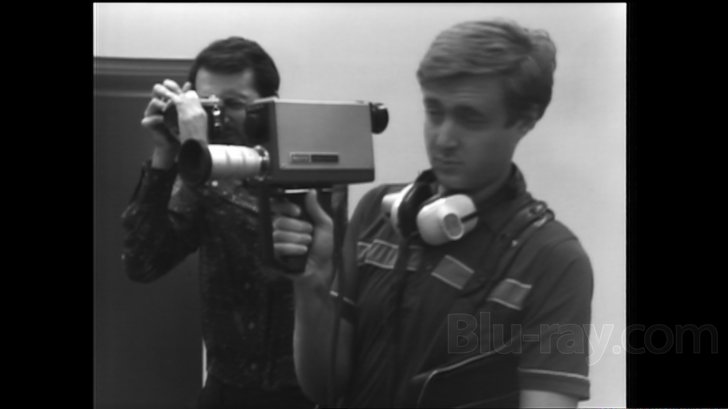
There has been a lot of enthusiasm for Andrew Bujalski's Computer Chess, but I have mixed feelings about it. Visually, it is rather unique, but thematically it is a bit too disorganized for my taste. While watching Computer Chess I could not stop thinking about Atom Egoyan's early films, all of which I think work much better. This said, Eureka Entertainment's presentation of the film is quite impressive. First time viewers should try to rent the Blu-ray release. Fans of the film can place their orders with confidence.
Similar titles
Similar titles you might also like

Tom of Finland
Limited Edition with Double Sided Poster
2017

That's My Boy
2012

Bill & Ted Face the Music
2020

One, Two, Three
Masters of Cinema
1961

Bananas
Arrow Academy
1971

Aquarius
Arrow Academy
2016

Pioneer
Pionér
2013

The Man Who Killed Hitler and Then The Bigfoot
2018

I'm So Excited!
Los amantes pasajeros
2013

Sleeper
Arrow Academy
1973

Passport to Pimlico
Vintage Classics
1949

The Club
El Club
2015

Crimes of the Future
1970

Smiles of a Summer Night
Sommarnattens leende
1955

Putney Swope
Indicator Series | Standard Edition
1969

The Bed Sitting Room
BFI Flipside
1969

Zama
2017

Goodbye to Language 3D
Adieu au Langage 3D
2014

Cemetery of Splendour
รักที่ขอนแก่น / Rak ti Khon Kaen
2015

Bob & Carol & Ted & Alice
Arrow Academy
1969
